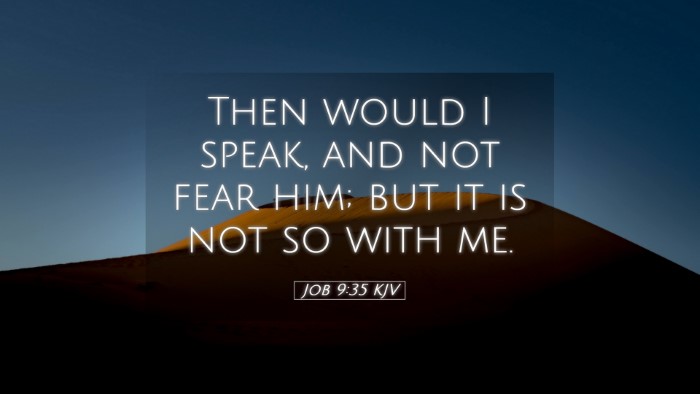Commentary on Job 9:35
Verse: Job 9:35
"Then would I speak, and not fear him: but it is not so with me." (Job 9:35, KJV)
Introduction
The Book of Job presents a profound dialogue on suffering, justice, and the nature of God. In Job 9:35, Job expresses his desire to communicate with God without fear, reflecting a deep yearning for understanding and clarity in his distress. This commentary synthesizes insights from multiple public domain sources to explore the theological and existential implications of this verse.
Contextual Analysis
The context of Job 9 is crucial for understanding Job's lament. Having endured immense suffering, Job contemplates the nature of God's governance and justice. Throughout the chapter, he highlights the overwhelming power of God and the human inability to contend with divine authority.
- Job's Dilemma: Job grapples with God’s transcendence which leaves him feeling insignificant and powerless.
- Theological Implications: This verse opens a dialogue about the nature of fear in relation to God; it's reflective of a desire for intimacy versus the recognition of divine authority.
Insights from Matthew Henry
Matthew Henry remarks on this verse as an expression of Job's internal conflict. He notes:
"When I think of God, I am immediately filled with both desire and dread; I want to speak to Him, yet I feel unworthy and fearful because of my own shortcomings."
Henry emphasizes that Job's desire to speak is indicative of a longing for a relationship with God that transcends fear, underscoring a theological tension present in the human relationship with the divine.
Insights from Albert Barnes
Albert Barnes provides a critical examination of Job's assertion, noting the following:
"Job expresses frustration over his feelings of being intimidated by God's majesty; he recognizes that a true dialogue cannot occur while fear dictates his actions."
Barnes explores the notion of divine silence in the face of human suffering, pointing out that while Job wishes to communicate without fear, he simultaneously acknowledges the barrier that divine omnipotence creates. He suggests that the fear of God, while reverent, can also be a hindrance to open communication.
Insights from Adam Clarke
Adam Clarke broadens the scope of Job's sentiments, suggesting:
"The absence of peace in Job's heart stems from the consciousness of divine judgment; Job's fear is inherently tied to his understanding of righteousness and justice."
Clarke posits that Job's expression reveals a deeper theological struggle; he longs for a mediator who can bridge the gap between his sinful state and God's holiness. Clarke argues that this foreshadows the eventual need for Christ as the ultimate mediator for humanity’s plight.
Theological Reflections
This verse serves as a poignant reminder of the complexities within the human condition in relation to divine interaction. It reflects the oscillation between.
- Longing for Dialogue: The human desire to converse with God in the midst of suffering.
- Fear of the Unknown: Natural fear that arises when confronted with the divine, especially during periods of suffering or trial.
- The Call for Mediation: An understanding that while we long to speak freely with God, there exists a need for mediation due to the holiness of God and the sinfulness of humanity.
Practical Applications
For pastors, students, and theologians, Job 9:35 invites contemplation on several points:
- Engagement with Suffering: How do we engage with God in our suffering? This verse encourages an open dialogue grounded in honesty.
- The Nature of Fear: It invites reflection on how fear of God should inform our approach to Him. Are our fears hindrances or catalysts for spiritual growth?
- The Role of Intercession: It provokes thought on Christ as our mediator, the one who allows us to approach God without fear.
Conclusion
In summary, Job 9:35 embodies the essence of human struggle with divine authority and our desire for relationship with God. The insights provided by Matthew Henry, Albert Barnes, and Adam Clarke collectively highlight the intricate balance between fear and longing that characterizes our interaction with the divine. This verse challenges us to seek a deeper understanding of God while recognizing our own limitations, ultimately pointing us toward the grace found in Christ as our intercessor.


